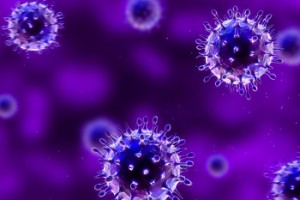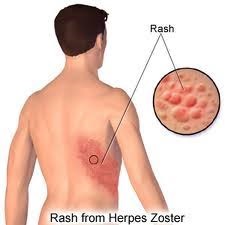It infects the body once, but the risk for relapse continues throughout a person’s life.
This is about the virus that causes herpes zoster. The first time it affects the organism, varicella zoster virus manifests as chickenpox. However, after it has been neutralized by the immune system, it rests in the nervous system, where it can remain in a dormant state for many years. Eventually, however, it awakens and following nerve pathways it affects the skin, taking the clinical form of herpes zoster.

During the first days, the patient feels pain, a burning sensation and tingling in the area that is infected by the virus. After a few days a vesicular eruption appears on the skin, which may last 7-10 days and it progresses as follows: initially red spots appear, on which blisters with liquid are progressively formed, which then break and finally a crust develops. The rash causes itching, while the patient may even have d fever, chills, malaise, headache and fatigue.
A patient who has developed herpes zoster can transmit the varicella zoster virus to anyone without immunity to chickenpox.Patients should avoid contact with other people, especially newborn babies, pregnant women and people with weak immune system, at least for the period that the blisters have not developed a crust.

Despite the fact that herpes zoster cannot be cured, timely management, within the first 72 hours from the development of the blisters, is important so that to accelerate the healing of the lesions, as well as for the limitation of pain and prevention of complications. Antiviral drugs are the first treatments. In general, treatment duration is approximately seven days.
As far as prevention is concerned, vaccination is the best choice. Primarily, the vaccine for chicken pox is included in the standard vaccination schedule of infants and is recommended for adults that have not been vaccinated in childhood. Although the vaccine does not guarantee that one will not become infected, it limits the risk of complications, and the severity of the disease.

Furthermore, since 2011, the US Food and Drug Administration (FDA) has given the green light for the administration of a vaccine against herpes zoster to people above the age of 50, who are among the high-risk group of people.
Click HERE for further information.